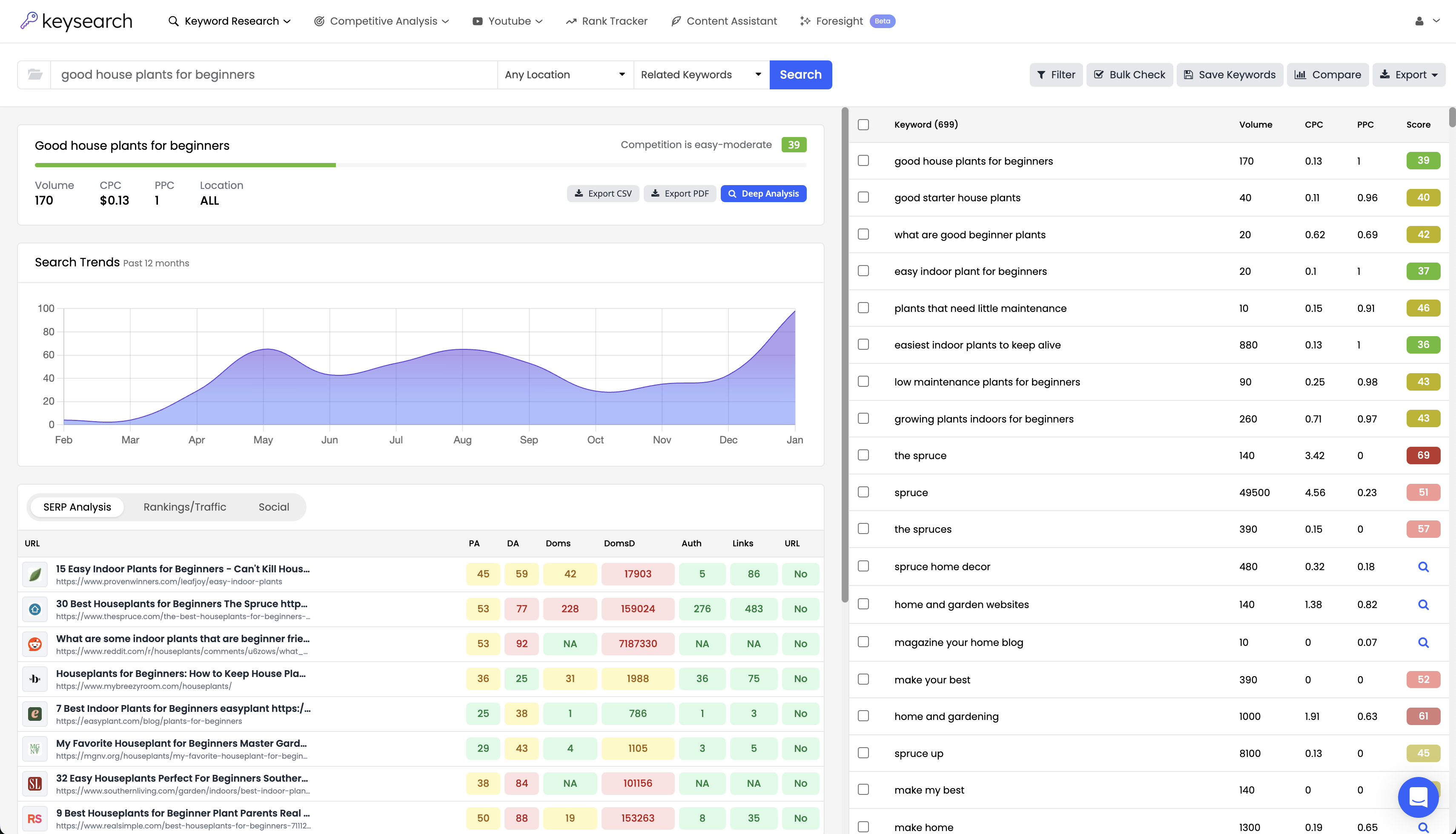Whether you’re trying to create a niche site or rank products on Amazon, eBay, Etsy, or anything in between, effective keyword research can make or break your success.
It lays the foundation for your SEO strategy and ensures you’re targeting the right opportunities from the get go. Otherwise, you could spend months spinning your tires, wasting time and resources.
But since you’re just starting out, money may be tight. Can I do keyword research for free? You certainly can, you just need to find the best free keyword research tool for your specific needs – we’re here to help.
Keysearch has developed the best suite of free SEO tools so anyone – novice to expert – can learn how to do keyword research for free. You gain access to simple keyword tools and more advanced solutions alike.
See for yourself why more than 10,000 publishers and brands trust our affordable keyword research tool over the alternatives. Open your account today and lay the groundwork for effortless SEO success!
Can I Do Keyword Research for Free?
First things first, can I do keyword research for free or am I going to be forced to invest in this part of my business?
Fortunately, you can save your money on backlinking, content creation, and other costs that come with doing business. There are plenty of ways to learn how to do keyword research for free.
This means that there is no excuse not to conduct comprehensive research for your website or e-commerce listings. It will guide everything you do going forward, from blog post creation to product page descriptions and titles.
At its core keyword research empowers you to understand what your audience wants so you can better connect with them. From there, you can serve them what they’re looking for and improve the visibility of your offerings.
So, how do I do keyword research for free? There are actually quite a few ways you can get the ball rolling without spending a hefty price tag on the analysis side of things.
Options like Google Keyword Planner and Google Trends offer powerful insights into popular search terms and their seasonal fluctuations. You can even rely on “People Also Ask” queries for blog post inspiration, or even steal your competitor's content strategy by browsing their site.
But, the truth is there is no better way to learn how to do free keyword research than with an actual free keyword research tool. So, let’s show you what to look for in the best free keyword tool so you can start your search.
What to Look for in the Best Free Keyword Research Tool
There are plenty of free keyword research tools at your disposal, but the one you choose to use dictates the direction you take from here on out – so it’s not something you should take lightly.
There are a few really important criteria to consider. The most important are the accuracy of insights you’re gaining, the depth of features you have access to, and of course, the actual price tag.
Is it Actually Free?
So many tools claim to be free – but once you get your account created you quickly discover that most of the features you actually want to use come at a cost.
Maybe your first search is free, but then, you need to upload a credit card for continued access. Or worse, you can run a search – but to analyze results you need to pay. Some “free” keyword tools are only free for a week before your trial expires.
The point is, you need to make sure you’re actually getting valuable, usable software without having to pay for it. Easier said than done, of course.
Look for tools that deliver genuine functionality without hidden fees, so you can perform thorough keyword research without encountering sudden roadblocks.
Ease of Use and User Interface
Just because it’s free doesn’t mean it should be clunky or hard to navigate. The best free keyword research tools are easy to get started with for complete beginners or seasoned experts alike, so you can hit the ground running without a massive learning curve.
A clean, organized dashboard with easy-to-understand metrics and navigation options saves time and enhances productivity. Some tools offer tons of features but they’re hard to actually make use of, so what’s the point? We prefer to keep things simple and straightforward.
Data Accuracy and Sources
The most important factor when choosing a free keyword research tool is the quality of data. This can make or break your entire SEO strategy.
Imagine spending months and dedicating countless resources towards ranking a certain page, only to find out in the end that the keyword you were so bullish on doesn’t actually have any search volume – or was dramatically more difficult than you were led to believe.
A reliable keyword tool should pull data from reputable and up-to-date sources, providing accurate search volumes, competition levels, and related keyword insights.
Check if the tool’s data aligns with trusted industry standards and cross-reference results with other tools when possible. The best way to figure out whether you can trust a tool’s insights or not is through the reviews from previous users.
Additional Features Offered
You need a solution that streamlines every task on your keyword research checklist. This means it must go beyond simply helping you find long-tail variations for your seed keyword, or assessing keyword difficulty.
Some platforms might also offer related keywords, LSI (Latent Semantic Indexing) terms, and search intent indicators, giving you a more comprehensive view of how to optimize your content.
Other features you might be interested in include content optimization tools, like keyword density checkers, plagiarism detectors, SERP simulations, and more. You should also have access to rank-tracking features so you can gauge success over time.
Unfortunately, most free keyword research tools are going to provide you with nothing more than basic functionality. That doesn’t mean more fulcrum options don’t exist – you just have to do a bit more digging!
Comprehensive Filtering and Export Options
Making sense of the data is key to actually panning out and executing your SEO strategy. It helps when you can easily filter through large volumes of data, like search volume ranges, competition levels, and keyword types.
This helps streamline your research by focusing on the most relevant terms. Better yet, see if you can export your keyword lists in formats that work for you, such as CSV or Excel files. Time is money, and the more you can save, the better.
What Makes Keysearch the Best Free Keyword Tool?
There’s a lot to consider in choosing the best free keyword tool, but you don’t have to look far. Your search ends here at Keysearch, the most sophisticated solution at your fingertips.
Our SEO toolkit is relied on by 10,000+ bloggers, businesses, and SEO agencies. Raptic, Ezoic, SEJ, Shopify, Mediavine, and more trust Keysearch, and you can too. With a 4.9/5 star rating and hundreds of glowing testimonials, you don’t have to just take our word for it, either!
A Truly All-in-One Solution
When we tell you this is a truly all-in-one SEO toolkit, we mean it. You’re not just going to discover seed keywords, but tons of other relevant opportunities backed by search volume, difficulty, and other metrics so you can weigh your options.
But unlike other free tools, Keysearch goes beyond the basics to deliver advanced features for free. From content creation support to rank tracking, competitor analysis, and more – here are some of the most popular features in the arsenal:
- Free robots txt generator
- Free keyword difficulty checker
- Free SERP simulator
- Free long tail keyword generator
- Free keyword density checker
- Niche finder
- Free LSI keyword generator
- Free duplicate content checker
- Free keyword clustering tool
There are always more features rolling out, too. We’re constantly building the latest and greatest tool for our users. There’s no need to bother with multiple tools in your SEO toolshed – we’ve got it all for you in one simple and free subscription.
Free or Low Cost
That’s right – Keysearch is actually free to start out with. Small businesses and bloggers will find that the free tier offers everything they need for effective, efficient keyword research and SEO execution!
But even as your needs scale up, you’ll find that our tools are still more affordable than the competition. Our starter plan is $240 for the entire year and unlocks up to 200 searches daily along with an array of other features.
We believe SEO should be more accessible, and we’re putting our money where our mouth is by delivering more value than any other SEO toolkit on the market.
User-Friendly Interface
You’ll love how quick and easy it is to start maximizing the functionality of Keysearch, whether you’re trying to learn how to do free keyword research for your niche site, how to do keyword research for YouTube, how to do Etsy keyword research, or anything in between.
Clear, actionable data displays, easy-to-use filtering options, and streamlined reporting make the research process straightforward and enjoyable. The tool’s logical flow supports users as they go from initial keyword exploration to deeper analysis with minimal friction.
Real-Time Data
Keysearch pulls data in a way no other tool does, merging real-time data from Google with insights from other search engines so you can make informed decisions with confidence.
You can tailor your research to the specific platform you’re trying to rank on, too – be it Google, YouTube, Amazon, or anything in between. Here are some of our most popular search engine specific features:
- Free Amazon keyword research tool
- Free Pinterest keyword research tool
- Free Etsy keyword tool
- Free eBay keyword tool
- Free YouTube keyword generator
You can even filter based on the country you’re trying to rank in. Keysearch gives you more control over the data you’re pulling than any other solution in its class.
How to Do Free Keyword Research With Keysearch
There’s no question that Keysearch is the best free keyword research tool on the market. But don’t just take our word for it – we encourage you to try it out yourself and be the judge! We’ll walk you through how to do keyword research for free using our solution below.
Start With a Seed Keyword
It all starts with figuring out your seed keyword – or in some cases seed keyword(s) if your brand has multiple offerings that aren’t covered by the same keyword.
The seed keyword should be the broadest possible term that encapsulates the main topic of your content. The broader, the better, as you’ll be able to pull in more long-tail variations (we’ll explain what those are in a moment).
You can typically use logic and topical understanding to come up with a good seed keyword for your business. If you run a blog helping busy individuals cook meals easily, your seed keyword might be “simple recipes,” or “easy recipes.” You could even go as broad as “recipes.”
If you’re just trying to learn how to do keyword research for Amazon or how to find keywords for Pinterest to sell products, the seed keyword will simply be the item you sell. Maybe it’s “artisan jewelry,” or “cribbage boards.”
Whatever the case, your seed keyword will be used to create the core of your SEO strategy, so take your time to figure out what makes the most sense.
Generating Relevant Long-Tail Variations
You’ve heard us reference long-tail keywords throughout this guide, but what are the advantages of long tail keywords?
These tend to get overlooked because they’re accompanied by lower search volume, but they can be a gold mine since they have lower competition and higher conversation rates.
Keysearch helps you uncover these on autopilot once you have a solid seed keyword. Just plug it into the search bar and see what comes up. You can even filter the search based on how many words you want in the phrase.
For example, some good long-tail variations for a recipe-inspired blog might be “quick healthy recipes for weight loss,” or “fast chicken recipes for dinner.” The possibilities are endless.
These targeted phrases help you zero in on user intent so you can create more tailored content that provides as much value as possible. Learn more about the differences between LSI vs long tail keywords in our blog.
Creating Keyword Clusters for Content Planning
Keyword clustering involves grouping related keywords that share search intent and context. This step in how to do free keyword research is especially important if you’re creating the SEO framework for an entire website, more specifically, a content-driven website.
These clusters help you rank each page you publish for as many relevant keywords as possible, driving higher traffic while avoiding teh risks of keyword cannibalization – where multiple pages compete for the same keyword.
For example, keywords like “quick chicken recipes,” “fast chicken recipes,” and “easy chicken recipes,” all share similar intent. It wouldn’t make sense to create different articles for each of these keywords – but rather, you’d create a single resource that ranks for all three.
Weighing Difficulty, Search Volume, and Relevancy
Once you have a good list of keyword opportunities broken into clusters it’s time to start filtering out those that are unrealistic. This is where keyword difficulty comes into play. So, what is a good keyword difficulty score?
There’s no one-size-fits-all answer as it’s entirely dependent on the level of site and topical authority you have. Brand-new websites need to focus on the easiest possible keywords, whereas those with a bit of skin in the game can go after more competitive keywords.
It’s easy to focus only on search volume, but these are almost always associated with higher competition. If you can’t rank for them, what’s the point in throwing resources at them?
Our advice is to spend more time trying to rank easier terms at first so you can generate some quick wins. The more keywords you rank for, the more natural backlinks you’ll acquire, and eventually, you’ll have the authority to go after more difficult terms.
Of course, relevancy always needs to be accounted for as well. If a keyword isn’t going to provide value to your business, there is no point in ranking for it just for the sake of traffic.
Prioritizing Your Next Steps
Understanding what to do after keyword research is just as important as the research itself. It’s just a matter of figuring out which of the clusters you’ve created present the greatest low-hanging fruit potential. From there, you can begin content creation and off-page SEO.
Start with clusters that align closely with your existing content or areas where you can easily build authority. Create high-quality content that delivers value, and then build high-quality backlinks to that content. It’s really that easy.
Keysearch has tools that support the content creation process, like our keyword density checker and duplicate content detector. Soon, we’ll even offer AI content creation tools! Like we said, we’re always striving to improve our offerings.
Tracking Success and Making Adjustments
As you begin executing your SEO strategy it’s essential to document performance through rank tracking – yet another feature available in the Keysearch software suite.
This helps you see which terms are driving the most traffic and which ones are underperforming. You can react to algorithm updates quicker when you see the changes in real time.
Regularly review these insights to adapt your content strategy, update existing articles with new long-tail keywords, and refine your SEO efforts based on real-time data. With the automated keyword research approach Keysearch offers, it’s easier than ever!
Other Ways to Do Keyword Research for Free
There you have it, how to do free keyword research with Keysearch! But as we said from the start, there are so many different ways to conduct effective keyword research without paying a cent. Here are some other tips on how to do keyword research for free.
Google Keyword Planner or Trends
Google gives you a few different tools for uncovering keyword opportunities. Their free keyword planner is an excellent starting point, although it’s primarily designed for advertisers. Still, you can pull meaningful insights on keyword search volume, competition, and related terms.
Pairing this with Google Trends empowers you to analyze search term popularity over time. You can spot seasonal trends and capitalize on emerging topics before they peak. This is especially powerful for those who sell items on shops like Amazon, Etsy, or Pinterest.
Other Popular SEO Toolkits
Keysearch is undoubtedly one of the best free keyword research tools, but there are plenty others you can consider as well. Just make sure any solution you try meets the criteria we laid out earlier, or you’ll be wasting your time.
While we may be biased, we strongly believe you won’t find a superior solution than ours. In fact, we’ve put together some comparisons of the most popular solutions so you can see for yourself what makes Keysearch the #1 choice:
Each of these free resources has its benefits, but in the long-run, they fall short of delivering even close to the same value Keysearch does. Experiment with them as you see fit, but we’re confident you’ll end up coming back to our tool!
Stealing Competitor Strategies
One of the easiest ways to conduct an effective SEO strategy is to see what’s working for a competitor in your niche and stealing it. There’s no need to reinvent the wheel!
You can streamline the process with Keyserach’s competitor analysis feature. Just input their URL and we’ll show you their top keywords and specific pages.
But even without Keysearch you can analyze competitors – take a look at the blog posts they’re writing about, the titles of their products, etc. There’s nothing wrong with spying on the competition as long as you’re putting your own unique twist on it.
People Also Ask and Related Keywords
There are few better ways to find relevant content topics than the People Also Ask section on Google, or the autosuggest feature on any search engine for that matter. These suggestions are derived from real user searches, so you know they’re backed by data.
You can expand People Also Ask questions into helpful blog posts, or use the autosuggest feature to identify long-tail variations of your seed keyword. But, there’s really no need to bother with this cumbersome approach – the best free keyword research tool is a click away!
Wrapping Up Our Guide on How to Do Keyword Research for Free
Don’t settle for anything less than the best free keyword tool as you set out on this journey. It can set you up for success from the start, whereas lesser tools will only hold you back or leave you spinning your tires.
The good news is you don’t have to play the guessing game about which free keyword research tool is best. We’ve shown you what separates Keysearch from the rest along with how to do keyword research for free.
Our blog has additional resources like how to research keywords for a niche, does keyword density still matter, how to find keyword density, how to find a profitable niche, and many more.
At this point, though, the only thing left to do is hit the ground running with Keysearch. You know it’s the best free keyword research tool, and you know how to do free keyword research with it to make the most of its feature set.
So what’s holding you back? Discover smarter keyword strategies with our tools today. Create your free Keysearch accont and see for yourself why it’s the #1 solution on the market!
- How to Do Keyword Research for Free: Best Free Keyword Research Tools in 2024 - December 13, 2024
- Benefits of Keyword Clustering: Why is it Important to Group Relevant Keywords Together? - December 13, 2024
- What is Keyword Density in SEO and Its Importance - December 13, 2024







